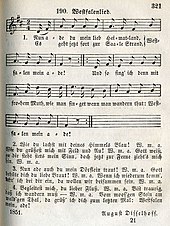August Disselhoff
August Friedrich Georg Disselhoff (born November 25, 1829 in Soest ( Westphalia ), † March 9, 1903 in Allstedt ) was a Protestant pastor. He became known as the poet of the song Well ade, you my dear homeland .
Life
August Disselhoff was the son of a Prussian tax and customs inspector. After his father was transferred, he grew up in Arnsberg from around 1841 and attended the Laurentianum grammar school there like his older brother Julius . He studied Protestant theology in Halle from 1848 and was a member of the Salingia fraternity there from 1848 . Initially Disselhoff was a brief tutor and preacher in Bad Oeynhausen . Then Disselhoff was assistant preacher in the miners' colony Neu-Andreasberg / Ramsbeck in the predominantly Catholic Sauerland in 1855 . There he was involved in the establishment of an evangelical community that had become necessary due to the immigration of thousands of Protestant miners from the Harz Mountains and the Kingdom of Saxony .
As early as the second half of 1855 Disselhoff worked as a pastor in Schwelm in Westphalia and then from 1865 for more than 20 years at the St. Jacobi Church in Berlin . Here he became one of the pioneers in the introduction of the children's church service and earned some social merits by founding associations such as the "Association for private nursing and community care" and the "Employment Association" (for women and girls). On January 1, 1888, he had to give up his office because of extensive blindness. In the following years, however, he taught for more than a decade at the daughter education institution of the Kaiserswerth deaconesses in Hilden near Düsseldorf . Disselhoff was connected to the Diakonie Kaiserswerth through his brother Julius and directly through Theodor Fliedner . In 1901 Disselhoff moved to his youngest daughter in Allstedt an der Helme in what is now Saxony-Anhalt, where he died two years later.
Others
- The text of the well-known song " Now ade, you my dear homeland " is a poem by August Disselhoff, which he wrote in 1848 as a 19-year-old probably near the ruins of the Arnsberg Castle on the occasion of his departure from Arnsberg. A plaque commemorates him.
- A memorial plaque can be found on the house where Disselhoff was born (Soest, Ulricher Str. 42), which is still preserved today.
- August Disselhoff spent his youth in Arnsberg at Schlossstrasse 21
- Disselhoff was married to Pauline Antonie Henriette Springorum since 1861 (October 8th). The short marriage produced three children. Pauline died when the third child was born, shortly after Disselhoff moved to Berlin in 1865. She stayed behind in Schwelm because she could not be expected to move at the time of her pregnancy.
- Disselhoff undertook several trips abroad for the church, for example to Italy and Syria.
Fonts (selection)
- About the story of the devil. A presentation. Beck, Berlin 1868.
- Hope for the 1,000-year Reich and its significance for the present Beck, Berlin 1874; 2nd ed. 1884.
- Help booklet for confirmation classes. Berlin 1874.
literature
- Friedrich Wilhelm Bauks: The Protestant Pastors in the Reformation Period up to 1945 . (= Contributions to the Westphalian church history; 4). Bielefeld 1980, p. 99, No. 1272.
- Friedrich Wilhelm Bautz : August Disselhoff. In: Biographisch-Bibliographisches Kirchenlexikon (BBKL). Volume 1, Bautz, Hamm 1975. 2nd, unchanged edition Hamm 1990, ISBN 3-88309-013-1 , Sp. 1331.
- Norbert Disselhoff: August Disselhoff, pastor and poet of the song "Well ade, you my dear homeland" . In: Heimatblätter des Arnsberger Heimatbund , Issue 24, 2003, pp. 60–77
- Karlheinz Limpert: August Disselhoff . In: From 900 years of the church in Schwelm - 1085-1985. Festschrift on the occasion of the first documentary mention of the church in Schwelm . Edited by the presbytery of the Ev. Kirchengemeinde Schwelm, Schwelm 1985, pp. 96–98
- Pauline Schrader: A picture of my father August Disselhoff's life . 1950
- Kurt Wollmerstädt: The Schwelm pastor August Disselhoff (1829-1901), poet of the song "Now ade, you my dear homeland" . In: Contributions to the local history of the city of Schwelm and its surroundings ; NF 33 (1983), pp. 35-54
Individual evidence
- ^ Helge Dvorak: Biographical Lexicon of the German Burschenschaft. Volume II: Artists. Winter, Heidelberg 2018, ISBN 978-3-8253-6813-5 , pp. 138-140.
Web links
- August Friedrich Georg Disselhoff in the Lexicon of Westphalian Authors
- Private church history page about August Disselhoff
- Song info
| personal data | |
|---|---|
| SURNAME | Disselhoff, August |
| ALTERNATIVE NAMES | Disselhoff, August Friedrich Georg (full name) |
| BRIEF DESCRIPTION | German Protestant pastor and poet |
| DATE OF BIRTH | November 25, 1829 |
| PLACE OF BIRTH | Soest , Province of Westphalia |
| DATE OF DEATH | March 9, 1903 |
| Place of death | Allstedt |



